The Prom: Will Gompertz reviews film with James Corden, Meryl Streep & Nicole Kidman ★★★☆☆
- Published
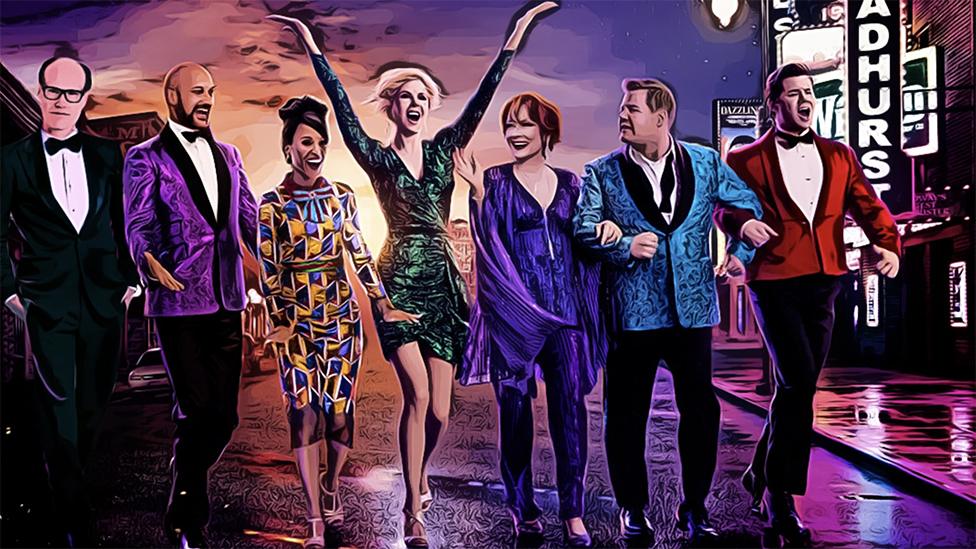
As you probably know, Ryan Murphy is the creative brains behind Glee. Ergo, he knows how to do feel-good musical comedy-drama set in a high school, which tackles social issues.
It's his genre.
No surprise then, that he's at the helm for the film adaptation of the Broadway musical The Prom, a feel-good musical comedy-drama set in a high school, which tackles social issues (homophobia, in this instance).
To accompany his stellar creds is an all-star class featuring Meryl Streep (in full Mamma Mia! mode), Nicole Kidman and James Corden (without a cat's tail this time, but with a camp American accent, which is only slightly less incongruous).
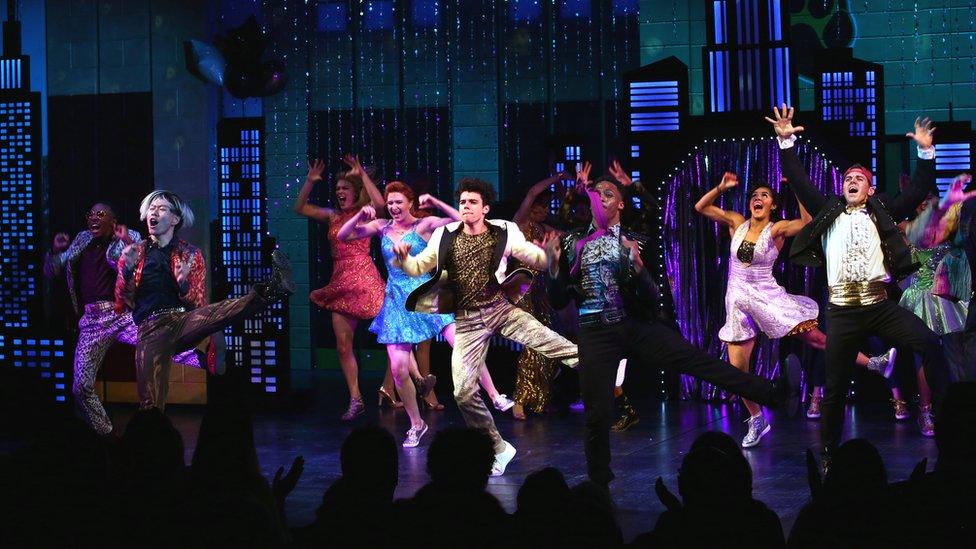
Curtain call on the opening night of The Prom at the Longacre Theatre on Broadway in 2018


James Corden as Bustopher Jones in the critically panned adaptation of Cats last year
If feel-good musical comedy-drama set in a high school, which tackles social issues is your sort of thing, you would expect The Prom to be the early Christmas present you've been waiting for in what has been a miserable year.
For the record, I'm not adverse to a feel-good musical comedy-drama set in a high school, which tackles social issues. I was brought up on Fame, and watched my children watch Glee.
I was looking forward to The Prom…
About half way through there's a scene in which two failing stage actors, Dee Dee Allen (Meryl Streep) and Barry Glickman (James Corden), are in a hotel room watching TV. The movie that happens to be on the telly is My Best Friend's Wedding. We get a tiny glimpse of the scene when Dermot Mulroney sings the opening lines of Jerome Kern's The Way You Look Tonight to Julia Roberts.
It's only on for about six seconds, but it is one of the best things in The Prom up to that point.


Meryl Streep as Dee Dee Allen and James Corden as Barry Glickman in The Prom

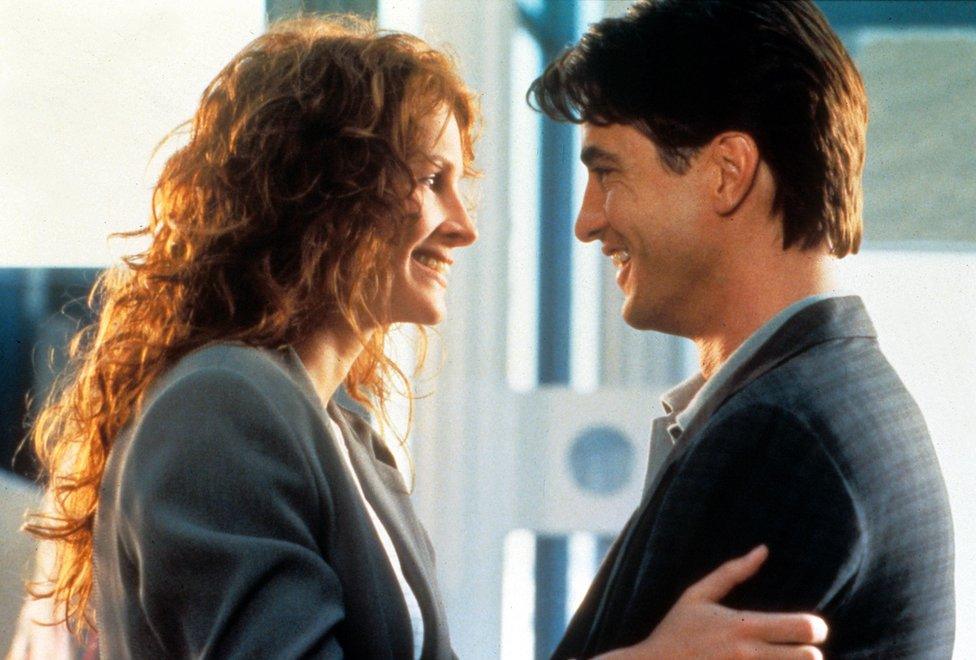
A scene from The Prom showing My Best Friend's Wedding with Julia Roberts and Dermot Mulroney is one of the high points
It doesn't start exactly badly, it's just a bit boring. The characters are one dimensional, the plot set-up is stodgier than a Christmas pudding, and you wouldn't catch a fish with any of the songs' hooks.
The story is a familiar tale of the disenfranchised and marginalised against the all-powerful system, with a decent serving of love, loss and redemption thrown in for good drama.
Emma (Jo Ellen Pellman) is a 17-year old High School student who has unwittingly caused the annual prom to be cancelled by insisting her accompanying date is another girl.
They're not that progressive over in Edgewater, and really don't care for lesbians, as Emma pithily sums up when singing, "note to self, don't be gay in Indiana".
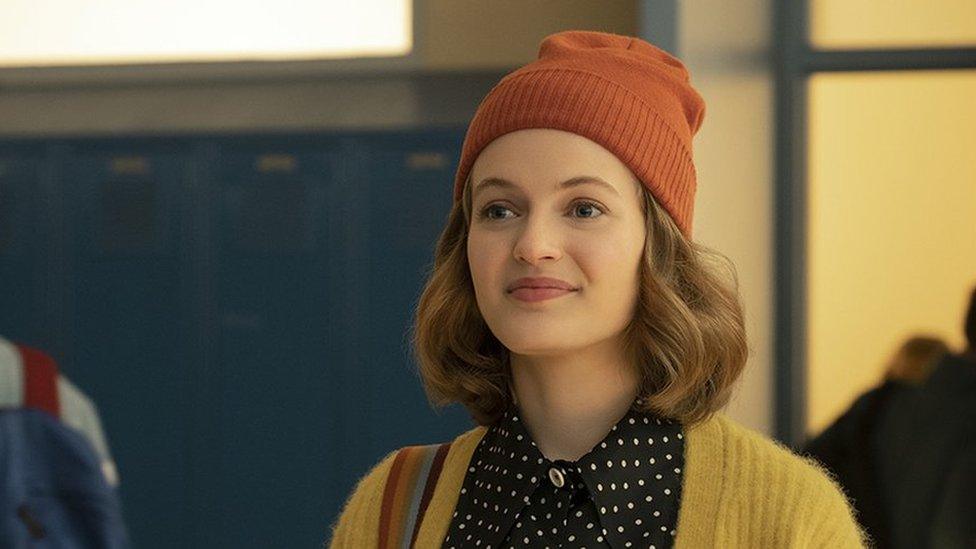
Jo Ellen Pellman plays high school student Emma, who's experiencing heartbreak and prejudice
Meanwhile, over in New York, four out-of-work actors with big egos drink alone in a bar and do what all actors do whether in work or not, and that is to talk about the old days. They need some positive publicity to reignite their careers.
Then Barry has a brain wave: "There is a very simple way where we still love ourselves yet appear decent human beings" he says in his moment of epiphany. They should, he concludes, become actor activists, before setting his fellow thesps the challenge: "All we need is a cause".
I think you can see where this is going. At least, where they are going.
They're off to Indiana to help themselves by pretending to help Emma and to "change the world one lesbian at a time".
Barry is as gay "as a bucket of wigs" and didn't go to his prom back in the day, so he gets it.
Dee Dee will do anything as long as she is the centre of attention, Angie (Nicole Kidman) has to kill time until someone, somewhere offers her the part of Roxie Hart, and Trent Oliver (Andrew Rannells) just wants to tell anybody who'll listen that he trained at Julliard.

(L-R) Andrew Rannells as Trent Oliver, James Corden, Meryl Streep and Nicole Kidman as Angie Dickinson
Everybody is on a personal journey, as is the way in feel-good musical comedy-dramas set in a high school, which tackle social issues.
And that includes Emma's homophobic fellow students, Mrs Greene (Kerry Washington), the homophobic head of the PTA, and the far more liberal Principal Hawkins (Keegan-Michael Key) who has a crush on Dee Dee, which is a case of poetic licence being extended beyond credibility.

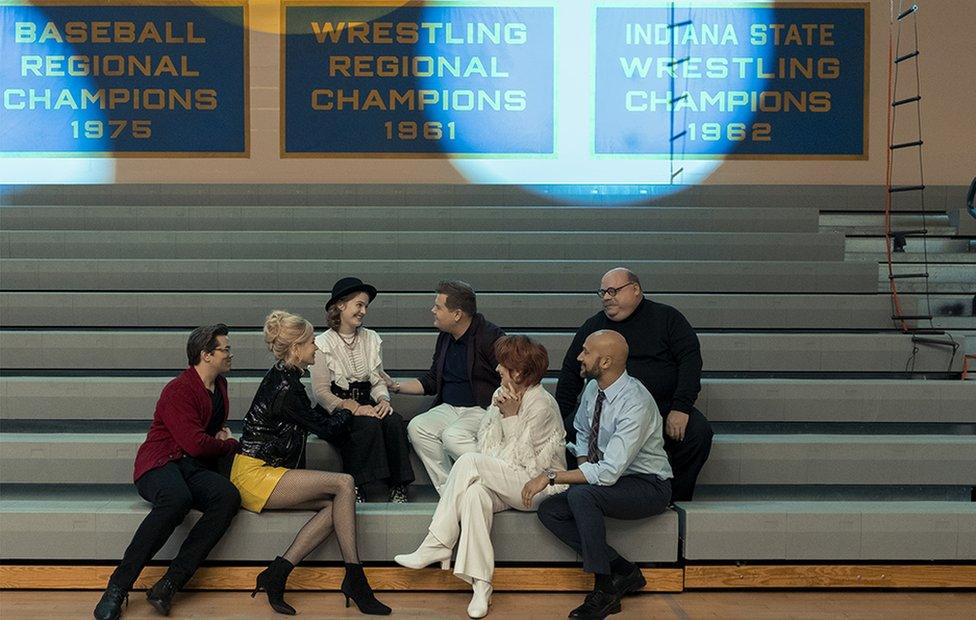
(L-R) Andrew Rannells, Nicole Kidman, Jo Ellen Pellman, James Corden, Meryl Streep, Keegan-Michael Key as Mr Hawkins and Kevin Chamberlin as Sheldon

There are some good moments, most of which either involved Meryl Streep or Jo Ellen Pellman.
There's a nicely observed scene as the four narcissistic actors arrive at their hotel, which is not quite what Dee Dee is used to. She demands the suite. The hotel doesn't have a suite. Dee Dee rummages in her handbag and pulls out a Tony Award and places it firmly on the counter. "Now do you have a suite?" she asks victoriously. They still don't have any suites. Dee Dee delves once more in her handbag and reaches out another Tony, and slams it down. "Surely I can have a room next to the spa", she pleads. There is no spa.
Streep and Co do a good job at sending themselves and their profession up, but just in case anybody thought what they did for a living was actually not important there is a counterbalancing narrative to set the record straight. The school doesn't have drama department, hence the lack of empathy, and so on.
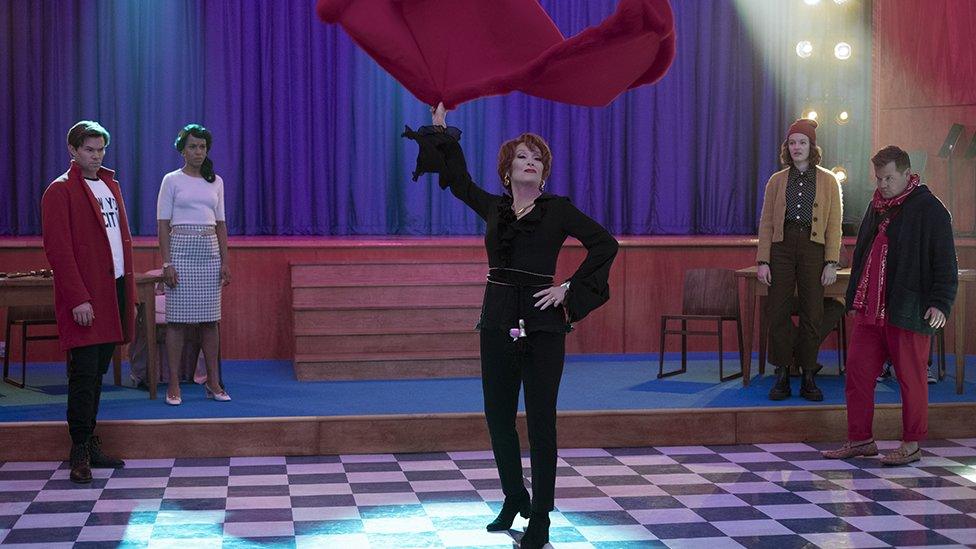
(L-R) Andrew Rannells, Kerry Washington (Mrs Green), Meryl Streep, Jo Ellen Pellman and James Corden
The second half improves as the characters are allowed to develop, and Emma's love life takes its inevitable twists and turns. There is a sense of pathos that emerges through the candy-coloured locations and spangly clothes.
There are even a couple of occasions when Ryan Murphy allows his hyperactive camera to settle on a shot before once again pushing in or pushing out or panning around or just moving, moving , moving.
At one point Dee Dee asks, "is there a restaurant in town which has plates and cutlery", which is a good line that also sums up the movie. The Prom does have plates and cutlery but they're not particularly well polished and the fare is some way off fine dining.
Recent reviews by Will Gompertz:
Follow Will Gompertz on Twitter, external
